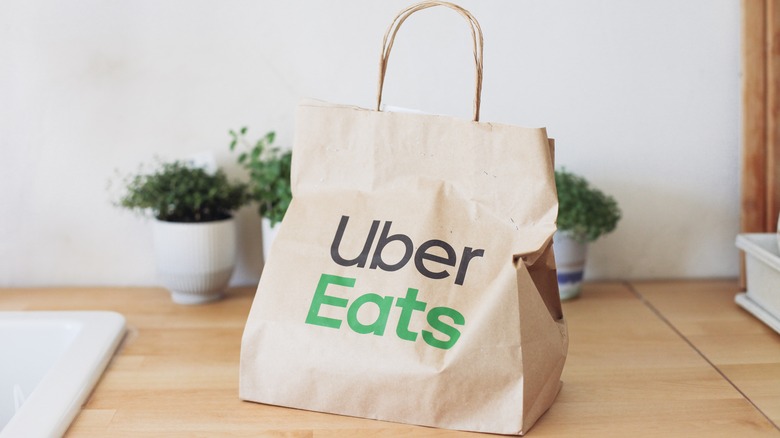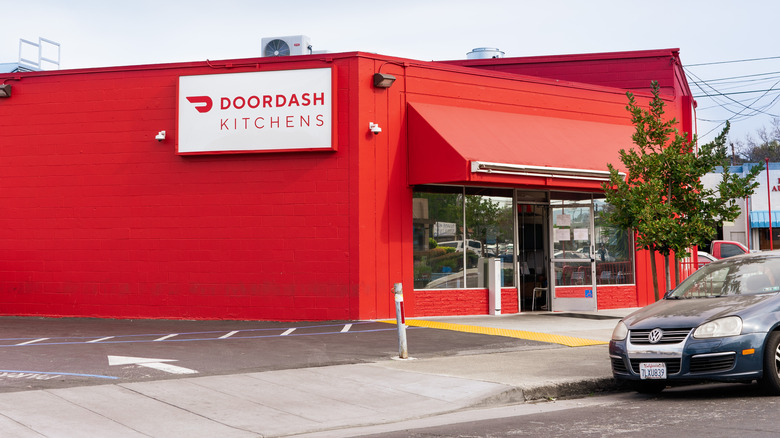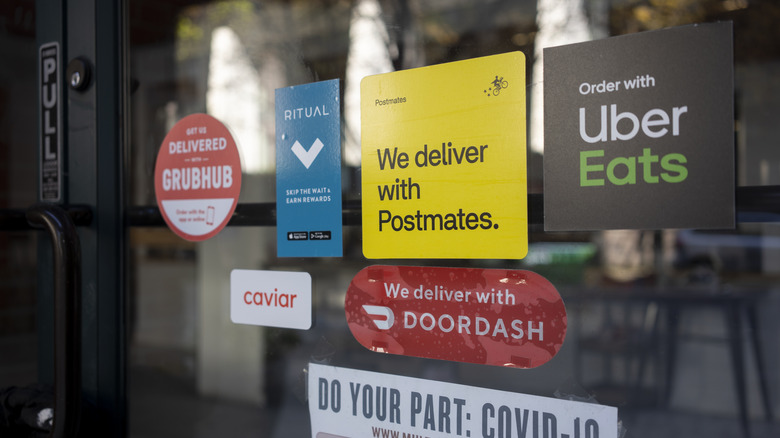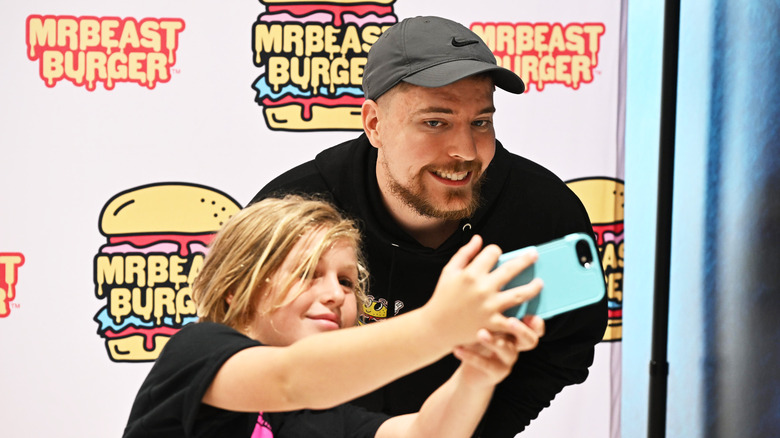Why Are All The Ghost Kitchens Disappearing?
By now, most of us have probably encountered a ghost kitchen. It started back in 2020, at the height of the COVID-19 pandemic. You'd exhausted your enthusiasm for home cooking, so you turned to the only other option: delivery apps like Uber Eats. Through the app, you discovered a new favorite restaurant, and when the pandemic-era closures lifted, you decided to dine there in person. That's when things got weird. Searching the restaurant's name on Google Maps turned up nothing, and when you copied the address off the delivery app, it showed a completely different business on the site. Sometimes it would be a familiar chain restaurant, but other times, it would be nothing but a blank storefront. Is this some kind of joke?
A ghost kitchen is a digital restaurant. It has no dining space and operates exclusively through third-party delivery apps. Each kitchen typically does business under multiple "virtual brands," each specializing in a different type of food, typically something basic like burgers, pizza, or wings. Ghost kitchens existed before 2020, but that chaotic year really launched the business model. According to Restaurant Business, 15% of restaurants used a ghost kitchen before the pandemic, but by the end of 2020, that number had leaped to 51%. At that time, many within the restaurant business predicted ghost kitchens to be the future of the industry, but fast-forward three years, and the opposite is true. Ghost kitchens are going out of business en masse. So, what happened?
How ghost kitchens work
To understand the fall of ghost kitchens, we need to begin at the rise. The digital restaurant concept emerged in the mid-2010s, originally as a way for brick-and-mortar restaurants to increase their visibility on delivery apps. The more brands a kitchen operates, the more likely it is to appear in search results. When the pandemic hit in 2020, restaurants that used ghost kitchens were better prepared to weather the storm, and those that didn't soon jumped on the bandwagon. Before long, ghost kitchen startups were popping up everywhere.
These operations can work in a few different ways. In some cases, a familiar restaurant chain develops an online alter ego, selling the same food it always did but under a new name. For example, Denny's has done business on Uber Eats under the names "The Burger Den" and "The Meltdown", selling burgers and grilled cheese sandwiches respectively.
In other cases, ghost kitchens are part of a much larger company that may own dozens of virtual restaurant brands. They either license those brands to local restaurants or establish their own facilities, often in a warehouse space. Examples include CloudKitchens, a startup from Uber co-founder Travis Kalanick, and Virtual Dining Concepts, created by Planet Hollywood CEO Robert Earl. The latter is best known for celebrity-themed virtual restaurants like MrBeast Burger and Guy Fieri's Flavortown Kitchen. You might recognize some of the names from your delivery apps; all of them are ghost kitchens, and all of them are now on the verge of collapse.
The trouble with ghost kitchens
The thought of ghost kitchens thrilled investors, who saw them as a means to maximize profit while minimizing expenses, but to others inside and outside the restaurant industry, the cons have ultimately outweighed the pros. For starters, operating a ghost kitchen doesn't actually save restaurant owners much, if any, money in the long term. While they may be able to cut down on space and staff, they face steep fees from third parties. CloudKitchens charges a 10% commission on orders under its brands, and this comes on top of the fees charged by delivery apps, which run as high as 30%. For some restaurants, delivery orders are actually a net loss.
Ghost kitchens haven't been too popular with customers either, many of whom find the practice deceitful. In 2020, a Reddit post from u/KendallNeff went viral, drawing some of the first major media attention to ghost kitchens. The user placed a GrubHub order from Pasqually's Pizza, believing it to be a local business needing support during the pandemic, only to discover her food actually came from Chuck E. Cheese. For those who value eating locally, the thought of chain restaurants gaining another leg up on small businesses can turn them against ghost kitchens entirely. Transparency matters to customers. According to Restaurant Dive, a 2023 report from the National Restaurant Association found that 70% of diners say they value a "publicly accessible, physical location" when it comes to ordering food. Ghost kitchens don't usually fit this bill, and that's a problem in more ways than one.
Ghost kitchens are a quality-control nightmare
In addition to angering customers and restaurant owners, ghost kitchens can cause headaches for those tasked with quality control, particularly local health departments. One of the largest ghost kitchen startups, Reef Technology, found itself repeatedly at odds with health inspectors in the Portland, Oregon area in 2022. Its kitchens, operating out of trailers, were flagged for everything from rats to overflowing trash, resulting in Reef shutting down 15 of its 23 Portland locations by the end of the year.
Quality control can also be an issue for celebrities who license their name to ghost kitchens. In August 2023, YouTuber Jimmy Donaldson, better known as MrBeast, filed a lawsuit against Virtual Dining Concepts to stop the operation of MrBeast Burgers, alleging that VDC had failed in its quality control obligations, resulting in numerous poor reviews that he believes damaged the MrBeast name.
Some delivery apps have also begun to strike back at the ghost kitchen industry. In March 2023, Uber Eats announced it would be wiping roughly 5,000 virtual businesses from its platform, largely due to a surge in identical offerings. Meanwhile, more diners are returning to eating in person due to the high fees associated with delivery. Now, the end seems nigh for ghost kitchens. In 2023 alone, CloudKitchens laid off staff and closed warehouses, Wendy's closed a line of ghost kitchens it had opened with Reef Technology, and Kitchen United, a ghost kitchen brand that once made big waves with Kroger, closed for business altogether.



